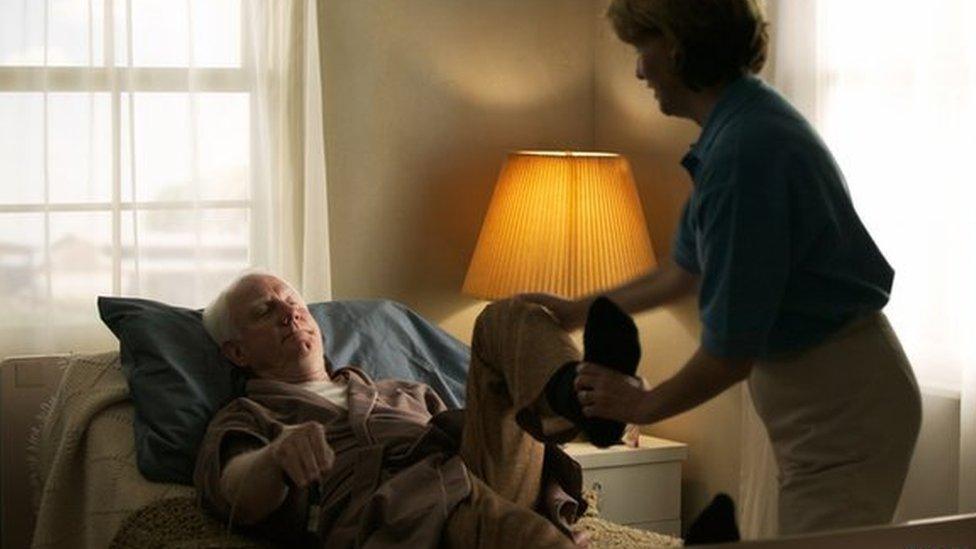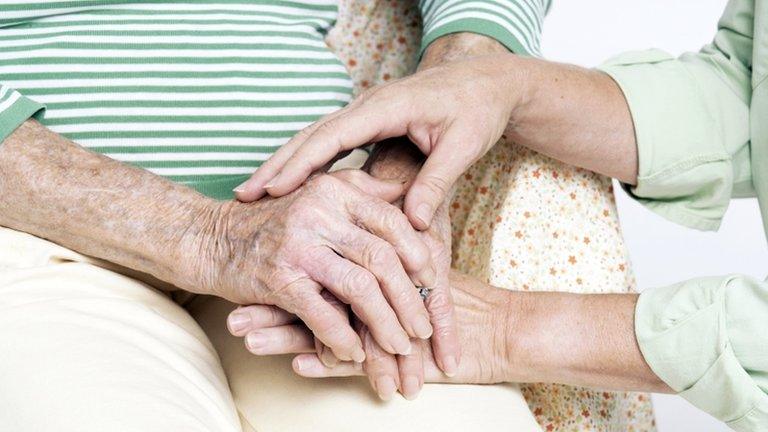Audit Scotland: Care changes 'should benefit more people'
- Published
- comments

The changes aim to give people who require care greater flexibility in when they are treated
Changes to social care to allow extra choice and control should be benefiting more people, a report says.
The Audit Scotland review found "no evidence" of the radical change needed to fully implement a 10-year strategy for self-directed support (SDS).
Since 2014, SDS has meant people who need care from a local authority have the option of being given cash to organise it themselves.
The new report said there was still a lot to do to provide this for everyone.
Councils spend £3.4bn a year on social care, supporting more than 200,000 vulnerable adults and 18,000 children and their families.
Assistance ranges from everyday tasks such as dressing and preparing meals to helping individuals live more fulfilling lives at home, at work and in their communities.
The reorganisation of social care means that support is now largely provided by the new local health and social care integration authorities, drawn from councils and the NHS.
The report for the public spending watchdog, the Accounts Commission, and the Auditor General, said many people had benefited from self-directed support but concluded not everyone was getting enough choice and control.

The report said there was more to do to provide SDS for everyone.
People lacking support from carers, personal assistants or friends and family, those aged 85 and over and people with mental health problems were less likely to benefit, it said.
The report said the Scottish government and partners had underestimated the challenges and the scale of change needed, while implementation had also stalled during the integration of health and social care.
More reliable data was needed on the choices available and people using social care services and their carers should have better information, it said.
The report also acknowledged authorities were facing significant pressures from increasing demand, limited budgets for social care services and challenges in recruiting and retaining social care staff.
Full potential
Ronnie Hinds, acting chairman of the Accounts Commission, said: "Authorities must respond more fully to provide services that make choice and control a reality for everyone who needs social care."
Auditor General Caroline Gardner said: "SDS is clearly working well for some people but many more people can and should benefit from it.
"The Scottish government has invested £70m in SDS and needs to work with its partners to boost progress and develop its full potential."
Public health minister Aileen Campbell said the Scottish government was extending funding for relevant independent information, advice and advocacy projects.
She said: "The report's recommendations give clear direction on what must be done to ensure that self-directed support becomes embedded as Scotland's mainstream approach to social care.
"We expect local authorities, who are responsible for implementing self-directed support, to make progress on implementing these recommendations."
Squeeze on local government
Councillor Peter Johnston, health and wellbeing spokesman for local authority group Cosla, said the report highlighted the scale of the challenge councils and integration authorities were facing.
He said: "Shifting to new models of care and support inevitably means facing the dual running costs of continuing, or slowly winding down, existing services until new models are fully in place.
"The squeeze on local government funding has undoubtedly impacted on the pace at which some areas are able to progress this.
"However, despite these challenges, Audit Scotland also found that most people rate their social care services highly - evidence that councils and integration authorities are continuing to deliver for our communities in the most difficult of circumstances."
Tory MSP Miles Briggs accused the Scottish government of being "sluggish" in implementing the strategy.
Labour MSP Colin Smyth said the government had failed to deliver "real progress" in the delivery of self-directed support.
- Published1 April 2014
